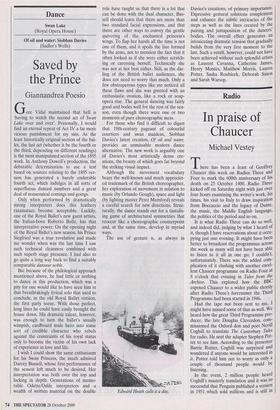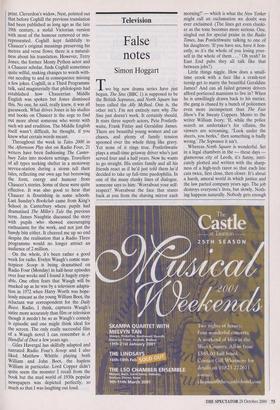Radio
In praise of Chaucer
Michael Vestey
There has been a feast of Geoffrey Chaucer this week on Radios Three and Four to mark the 600th anniversary of his death on 25 October 1400. Radio Three kicked off on Saturday night with just over four hours examining the writer's work, his times, his visit to Italy to draw inspiration from Boccaccio and the legacy of Dante, the music, the Middle English language, the politics of the period and so on. It is what Radio Three can do so well, and indeed did, judging by what I heard of it, though I have reservations about it occu- pying just one evening. It might have been better to broadcast the programmes across the week as many will not have been able to listen to it all in one go; I couldn't, unfortunately. There was the added com- plication of it clashing with another excel- lent Chaucer programme on Radio Four at 8 o'clock that evening in Tales from the Archive. This explored how the BBC exposed Chaucer to a wider public shortly after Radio Three's forerunner the Third Programme had been started in 1946. Had the tape not been sent to me, I might have missed some of that as well. We heard how the great Third Programme pro- ducer, the late Douglas Cleverdon, com- missioned the Oxford don and poet Nevin Coghill to translate The Canterbury Tales for radio. He sent the adapter Stephen Pot- ter to see him. According to the presenter Barrie Rutter, Coghill was surprised and wondered if anyone would be interested in it. Potter told him not to worry as only a couple of thousand people would be listening. In the event, 2 million people heard Coghill's masterly translation and it was so successful that Penguin published a version in 1951 which sold millions and is still in print. Cleverdon's widow, Nest, pointed out that before Coghill the previous translation had been published as long ago as the late 19th century, a stolid Victorian version with most of the humour removed or mis- represented. Coghill kept faithfully to Chaucer's original meanings preserving his metres and verse flows; there is a natural- ness about his translation. However, Terry Jones, the former Monty Python actor and a Chaucer scholar, finds Coghill sometimes quite wilful, making changes to words with- out needing to and in consequence missing a few jokes. Coghill, in a Third Programme talk, said magisterially that philologists had established how Chaucerian Middle English was spoken but Jones dismissed this. No one, he said, really knew, it was all guesswork. What drives Jones in his studies and books on Chaucer is the urge to find out more about someone who wrote with such wit and erudition. The Middle English itself wasn't difficult, he thought, if you knew what certain words meant.
Throughout the week in Tales 2000 in the Afternoon Play slot on Radio Four, 21 writers have been fashioning The Canter- bury Tales into modern settings. Travellers of all types seeking shelter in a motorway service-station during a storm tell their tales, reflecting our own age but borrowing the form, energy and humour from Chaucer's stories. Some of these were quite effective. It was also good to hear that Chaucer is flourishing in some schools. Last Sunday's Bookclub came from King's School in Canterbury where pupils had dramatised The Miller's Tale the previous term. James Naughtie discussed the story with pupils who showed encouraging enthusiasm for the work, and not just the bawdy bits either. It cheered me up no end despite the realisation that a Radio Three programme would no longer attract an audience of 2 million.
On the whole, it's been rather a good week for radio. Evelyn Waugh's comic mas- terpiece Scoop is being dramatised on Radio Four (Monday) in half-hour episodes over four weeks and I found it hugely enjoy- able. One often fears that Waugh will be mucked up as he was by a television adapta- tion in 1972 when Harry Worth was hope- lessly miscast as the young William Boot, the reluctant war correspondent for the Daily Beast. Radio, I think, captures Waugh's satire more accurately than film or television though it needn't be so as Waugh's comedy is episodic and one might think ideal for the screen. The only really successful film of a Waugh novel I can remember is A Handful of Dust a few years ago.
Giles Havergal has skilfully adapted and narrated Radio Four's Scoop and I also liked Matthew Whittle playing both William and John Boot, the hapless William in particular. Lord Copper didn't quite seem the monster I recall from the book but the mad world of 1930s popular newspapers was depicted perfectly, so much so that I was laughing out loud.



























































































 Previous page
Previous page